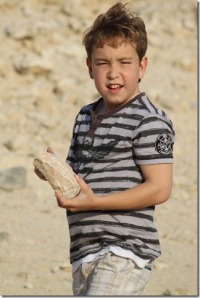
This week is DonateLife Week and, to mark the occasion, I signed up to be an organ donor.
DonateLife Week (Sunday 24 February—Sunday 3 March) is Australia’s national awareness week to promote organ and tissue donation.
There are around 1600 Australians waiting for an organ transplant. Sadly, many of them will die while they wait for a second chance at life through a heart, liver, kidney, lung or pancreas transplant.
For others like my friend Jordan, the wait for a transplant means regular trips to hospital for blood tests and dialysis.

I met 10-year-old Jordan in 2010; he was bright, lively and full of compliments. He had me charmed with his big smile and bigger personality.
The oldest of four boys, Jordan was suffering from chronic renal failure after being born with kidney hypoplasia—which means he was born with undersized kidneys.
Doctors warned his parents, Stephen and Cherie, that it was unlikely their baby would survive.
But Jordan was a fighter and in July 2010 he received an incredible gift—a new kidney, which he named Bob.
He is now an active 12-year-old and a much-loved big brother. He is learning the drums, loves to cook and is enjoying a world with chocolate (a snack he wasn’t able to eat before his transplant!).
By choosing to record your donation decision on the Donor Register (it takes less than two minutes to do—you just need your Medicare card), you could save the lives of up to 10 people like Jordan and improve the lives of dozens more.
In 2012, 1,052 Australians received transplants from 354 donors.
But with as little as 1 per cent of people actually dying in hospital in the specific circumstances where organ donation is possible, it is important that people not only register to be a donor but also support their loved one’s decisions regarding donation.
Families will always be asked to confirm the donation wishes of the deceased before donation can proceed—but sadly, less than 60 per cent of families give consent for donation to proceed.
Which is why it is so important for people to discuss their wishes with their loved ones.
Who can donate?
- Almost everyone can help others through organ and tissue donation.
- However the governing factors are where and how a donor dies and the condition of their organs and tissues.
- While your age and medical history will be considered, you shouldn’t assume you’re too young, too old or not healthy enough to become a donor.
- All major religions support organ and tissue donation and transplantation.
- The aged and people with chronic health conditions can still be donors; only a few medical conditions preclude donation of organs.
- People can also donate a kidney or part of their liver while they are still alive, though this is usually restricted to those wanting to transform the life of someone they know.
- A donor’s gift and a patient’s hopes are in good hands. Australia has a world-class reputation for successful transplant outcomes.
Organ donation. The facts.
- One organ and tissue donor can transform the lives of 10 or more people.
- Around 1600 people are on Australian organ transplant waiting lists.
- In 2012, 354 organ donors gave 1,052 Australians a new chance in life.
- The number of organ donors and transplant recipients in 2012 was the highest since national records began.
- The majority of Australians are generally willing to become organ (80%) and tissue (78%) donors.
- Only around 1% of people actually die in hospital in the specific circumstances where organ donation is possible. The circumstances in which you can become a tissue donor are less limited.
- In Australia the family will always be asked to confirm the donation wishes of the deceased before donation can proceed—but less than 60% of families give consent for donation to proceed.
- 44% of Australians do not know or are not sure of the donation wishes of their loved ones.
- The majority of Australians (92%) that are aware of their family members’ wishes indicate that they would uphold those wishes.
For more information about organ and tissue donation or to find out how to register, visit www.donatelife.org.au.

So wish I could donate :(. My dad donated his corneas when he passed away.
LikeLike